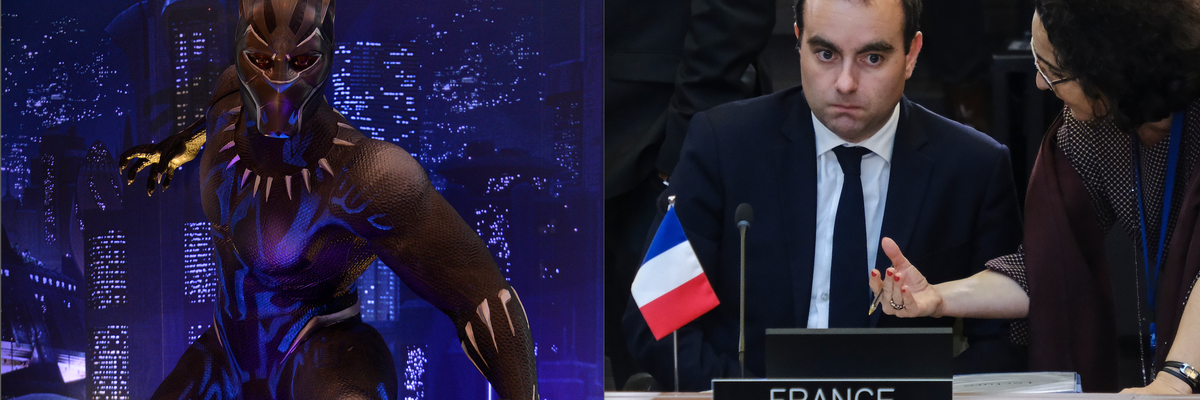On February 12, French Defense Minister Sebastien Lecornu tweeted a condemnation of a scene from Marvel’s 2022 film “Black Panther: Wakanda Forever.”
The scene shows elite soldiers from the fictional African country Wakanda dramatically entering a United Nations meeting in Geneva. The Wakandan soldiers hand-deliver, to France’s representative, a group of captured French “mercenaries.” These French personnel were captured while attacking a “Wakandan Outreach Center” in Ansongo, Mali and attempting to steal samples of vibranium, the fictional mineral that only Wakanda (and, it turns out, a fictional post-Aztec underwater society) possesses.
Parading the captured Frenchmen into the UN chamber, the Wakandan soldiers underscore their queen’s message — directed at a smarmy American official and the patronizing French representative — that Wakanda will not share vibranium with power-hungry Western nations.
Why couldn’t Lecornu dismiss this as mere entertainment? The answer has to do with France’s increasingly resented political and military presence in Africa, and above all in Mali — where a junta, after taking power in 2020, has increasingly made France unwelcome. In his tweet, Lecornu harkened back to France’s 2013 intervention in Mali while its northern half (including Ansongo) was under jihadist occupation; he wrote, “I think of and pay homage to the 58 who died in defending Mali, at its request, confronting Islamist terrorist groups.”
A decade later, French flags are being resewn into Russian ones in Mali’s capital Bamako. France (and the United States) are deeply concerned about anti-French and pro-Russian messaging on the African continent, making the media sphere a key battleground in Paris’s eyes. One major anti-French theme in Mali and beyond is the charge that France’s presence in Africa is ultimately motivated by a desire to control the continent’s resources.
Lecornu’s tweet falls flat on a few levels. First, for many audiences, Wakanda is an Afro-futurist utopia and a symbol of African pride, self-assertion, independence, and sovereignty. Second, “Wakanda Forever,” a sequel to the 2018 “Black Panther,” is also in large part an extended tribute, merging on-screen and off-screen worlds, to Chadwick Boseman, a widely beloved actor who starred in the first film and died, heartbreakingly, of colon cancer in 2020. It’s clear what Boseman meant to his fans. Given these circumstances, for Lecornu to take a shot at the film comes across as tone-deaf and petty.
What are the film’s politics, meanwhile? Both Black Panther films experiment with a range of perspectives on what revolution and sovereignty mean, not only putting radical politics in the mouths of the films’ villains but also making those villains sympathetic. In “Black Panther,” the ambitious Eric Killmonger/N’Jadaka wants to harness Wakanda’s power to launch an assault on behalf of all African peoples worldwide; in “Wakanda Forever,” the undersea ruler Namor wants to launch a pre-emptive strike on the world’s major powers in order to keep vibranium for his kingdom and Wakanda alone.
The first film was the subject of many provocative analyses, for example by Steven Thrasher, who points out the various threads — revolutionary and conservative, feminist and patriarchal — that make the film challenging and interesting but also potentially frustrating. The second film centers female characters and is similarly interested in the idea of anti-colonialism and revolution (the final scene reveals that Boseman’s character has a secret son, hidden away in Haiti, whose Haitian name is Toussaint, a reference to the Haitian revolutionary Toussaint Louverture, in what could be read as an additional shot at France). Yet there is also much to ponder about the limits of revolutionary politics in the context of Marvel’s close and long-running collaboration with the U.S. military.
The second film, likes the first, positions the Wakandan elite as more interested in protecting their country than in remaking the world — although the presence of a Wakandan Outreach Center in Mali, essentially a scientific laboratory but also a military outpost of sorts, hints at a pan-Africanist vision where a place like Ansongo, currently wracked by violence and displacement, would benefit not from French counterrorism forces (or Russian mercenaries) but rather from the help of a benevolent African superpower. (As a side note, Mali, both the present-day, war-torn country and the wealthy medieval empire, influenced the films’ writer-director Ryan Coogler.)
Meanwhile, the second film’s full-throated defense of sovereignty could be read as a critique of the last 20 years of American (and French) foreign policy. In the UN chamber scene, the French representative tells the Wakandan queen that vibranium could be used for “weapons of mass destruction.” There seems to be a not-so-veiled criticism here of the U.S. invasion of Iraq in 2003, as well as current policy towards Iran and North Korea. The film only gestures to these questions, but Namor’s final speech anticipates that the battle for control of vibranium is only beginning.
Back in the real world, French officials might reflect on the ways in which appearing thin-skinned about charges of imperialism can actually reinforce the image of France as imperialist. France has easy steps it could take to bolster its image in Africa, beginning with an apology for colonial abuses in Algeria.
Meanwhile, U.S. officials might note that in “Wakanda Forever” and beyond, the United States is also frequently described as a “colonizer” — if America sometimes enjoys a more positive image in Africa than France or Britain, this does not mean that Washington cannot be perceived as hectoring and hypocritical. Aside from one, partly dissident CIA agent, the United States is portrayed in the film as willing to flout Wakandan sovereignty; one CIA official not just lusts after vibranium, but relishes a scenario in which the United States would be the mineral’s only holder.
The film is not real life, but it is one mirror in which Western powers can consider their image in Africa and elsewhere in the formerly colonized world.
















